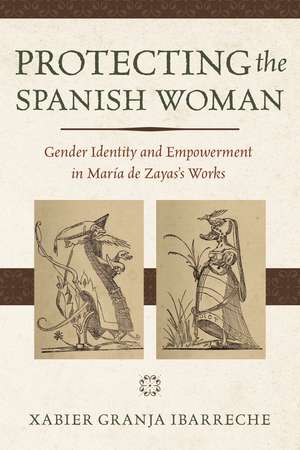Protecting the Spanish Woman: Gender Identity and Empowerment in María de Zayas's Works
Autor Xabier Granja Ibarrecheen Limba Engleză Paperback – 4 sep 2023 – vârsta ani
María de Zayas is unique in the seventeenth century as the only Spanish woman to write a collection of exemplary novels whose quality is often compared to Miguel de Cervantes’ masterful works. Her two main collections of short stories, Novelas amorosas y ejemplares and Desengaños amorosos, encompass a social critique based on literary fiction that exposes flaws in the idealized archetypes of masculine identity in early modern Spain. Zayas’s stories redefine women’s patriarchal disadvantage as a tool to expose the ways in which early modern Spanish women could be empowered to counteract men’s discursive and political authority, which they use to unfairly maintain their own social privilege.
Xabier Granja Ibarreche explores how Zayas defies Spanish hegemony by manipulating and transforming the ideals of courtly masculinity that had been popularized by conduct manuals and the traits they specified for appropriate noble comportment. In doing so, Zayas elaborates a nonofficial discourse throughout plots that subvert patriarchal hierarchies: she rearticulates the existing ideological order to empower women who are no longer willing to remain silent and oppressed by masculine domination after centuries of failing to attain a sufficiently self-sufficient political position to ascend in the social hierarchy. By inverting the male gaze that assumes masculinity as a preeminent identity, Zayas subverts the patriarchal subject/masculine, object/feminine order and destabilizes manly superiority as a basic universal reality, thereby empowering and unshackling Spanish women to liberate Iberian culture from the repressive and pernicious future she forebodes.
Preț: 477.82 lei
Nou
Puncte Express: 717
Preț estimativ în valută:
91.44€ • 95.11$ • 75.49£
91.44€ • 95.11$ • 75.49£
Carte disponibilă
Livrare economică 24 martie-07 aprilie
Preluare comenzi: 021 569.72.76
Specificații
ISBN-13: 9781647790844
ISBN-10: 1647790840
Pagini: 280
Dimensiuni: 152 x 229 x 33 mm
Greutate: 0.4 kg
Editura: University of Nevada Press
Colecția University of Nevada Press
ISBN-10: 1647790840
Pagini: 280
Dimensiuni: 152 x 229 x 33 mm
Greutate: 0.4 kg
Editura: University of Nevada Press
Colecția University of Nevada Press
Recenzii
“The author enhances his discussion of her fiction with historical case studies of abused women from the time during which Zayas lived and wrote. This archival material . . . is a welcome addition to the consideration of Zayas’s stories and reflects her complexity.”
—Marina Brownlee, Robert Schirmer Professor of Spanish and Portuguese Languages and Cultures and Comparative Literature, Princeton University, author of The Cultural Labyrinth of María de Zayas
“This manuscript makes a significant and novel contribution with the inclusion of archival evidence and a new theoretical approach which accounts for early modern gender identities. The research is carefully done, sources are well documented, and the author demonstrates a very good knowledge of the field. “
—Yolanda Gamboa, professor of Spanish, Florida Atlantic University, author of Cartografía social en la narrativa de María de Zayas
—Marina Brownlee, Robert Schirmer Professor of Spanish and Portuguese Languages and Cultures and Comparative Literature, Princeton University, author of The Cultural Labyrinth of María de Zayas
“This manuscript makes a significant and novel contribution with the inclusion of archival evidence and a new theoretical approach which accounts for early modern gender identities. The research is carefully done, sources are well documented, and the author demonstrates a very good knowledge of the field. “
—Yolanda Gamboa, professor of Spanish, Florida Atlantic University, author of Cartografía social en la narrativa de María de Zayas
Notă biografică
Xabier Granja Ibarreche, PhD, is an associate professor of Spanish at The University of Alabama in Tuscaloosa. He holds an MA in Hispanic literature and earned his PhD from the University of Illinois at Chicago. He specializes in early modern Spain and the incipient stages of the Enlightenment, along with Women as Writers and Gender Studies.
Cuprins
Preface
Acknowledgments
Introduction
Chapter One: Man Redefined: Hegemony, History, and Refashioning
Chapter Two: Woman Nullified: The Gendered Dangers of Noblemen’s Despotism
Chapter Three: Woman Victimized: The Sexual Assault in Patriarchal Oppression
Chapter Four: Woman Brutalized: The Bodies Broken by Masculine Violence
Chapter Five: Conclusion: Woman Redefined
Bibliography
Index
About the Author
Acknowledgments
Introduction
Chapter One: Man Redefined: Hegemony, History, and Refashioning
Chapter Two: Woman Nullified: The Gendered Dangers of Noblemen’s Despotism
Chapter Three: Woman Victimized: The Sexual Assault in Patriarchal Oppression
Chapter Four: Woman Brutalized: The Bodies Broken by Masculine Violence
Chapter Five: Conclusion: Woman Redefined
Bibliography
Index
About the Author
Descriere
Zayas defies Spanish hegemony by manipulating and transforming the ideals of courtly masculinity.
